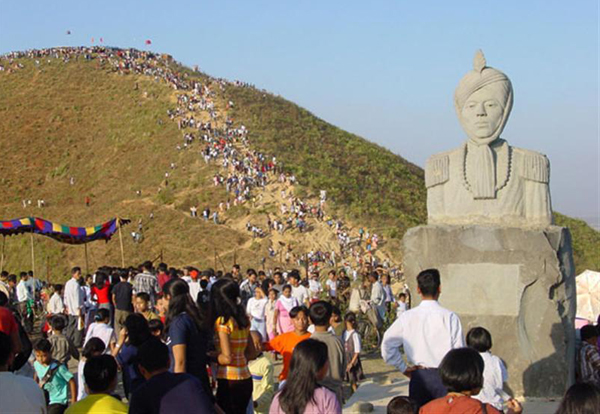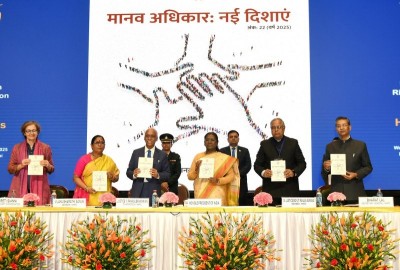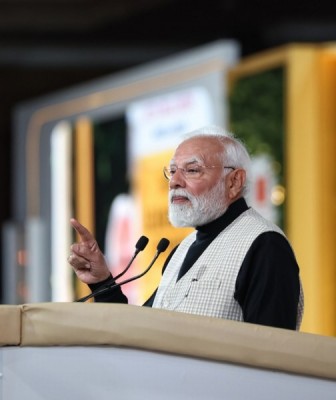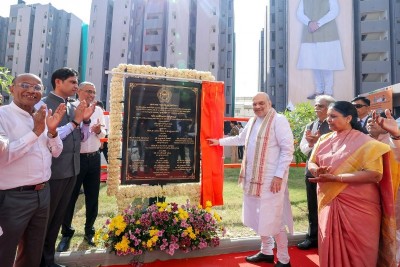
Manipur: Kuki negotiations drag on
The eight underground groups under UPF are: Kuki National Front (KNF), Zomi Revolutionary Organisation (ZRO)/Zomi Revolutionary Army (ZRA), Kuki Revolutionary Army - United (KRA-United), Zomi Defence Force (ZDF), United Kuki Liberation Front (UKLF), Kuki Revolutionary Front (KRF), Zomi Defence Volunteers and Hmar People's Convention-Democratic (HPC-D).
A second umbrella organization of 11 Kuki underground groups in Manipur, the Kuki National Organisation (KNO), had also signed a tripartite Suspension of Operations (SoO) agreement with the Government of India and Government of Manipur in 2008. The underground groups in KNO are: Kuki National Army (KNA), Kuki National Front - Military Council (KNF-MC), Kuki National Front - Zogam (KNF-Z), United Socialist Revolutionary Army (USRA), Hmar National Army (HNA), United Komrem Revolutionary Army (UKRA), United Minorities Liberation Front (UMLF), Zou Defence Volunteer, Kuki Liberation Army (KLA), and Pakan Reunification Army (PRA). There is confusion over the name of the 11th armed group, either called KRA or Kuki National Front - Samuel (KNF-S).
The tripartite SoO agreement with UPF and KNO was signed on August 22, 2008. Since then, these agreements were periodically extended till August 21, 2014. As per the provisions of the SoO agreements, the cadres of these 19 Kuki groups - 1,122 under KNO and 1,095 under UPF - are housed in12 [seven for KNO and five for UPF] designated camps in the Churachandpur, Sadar Hills (Senapati) and Chandel Districts.
While the Kuki militants remained in their designated camps, there was confusion regarding the extension of the SoO agreements after August 2014. An October 7, 2014, report claimed that the tripartite SoO agreements with UPF and KNO had been extended by another year. According to the report, following the Government's failure to initiate necessary procedures for extension of the SoO pact, the convenor of the People's Consultative Committee for Peace (PCCP), S.H. Seipu Sitlhou submitted a representation to the then Union Home Secretary Anil Goswami on September 6, urging the Union Government to extend the SoO pact. Subsequently, the Under Secretary, Union Ministry of Home Affairs (MHA), sent a letter to the Government of Manipur stating that the SoO pact had been extended by another year. The letter also suggested fixing a date for holding a tripartite political dialogue. A copy of the letter sent by the MHA Under Secretary was also reportedly received by the PCCP. Later, on February 25, 2015, Union Minister of State for Home Affairs Kiren Rijiju, while replying to a query on the groups under the ceasefire in the Northeast, mentioned both KNO and UPF. However, UPF and KNO were against holding tripartite talks in Imphal. The present renewal of the SoO suggests that the Agreements were in limbo over the past months.
Whatever the case, the present agreement to extend the SoO and initiate a political dialogue is with UPF alone, leaving KNO out.
Significantly, the period of the tripartite SoO (August 2008 to August 2014, regarding which there is no confusion) has witnessed 113 fatalities (including 10 civilians, three Security Force (SF) personnel and 100 militants) killed in incidents relating to Kuki militant outfits. The high proportion of militant fatalities in this period was primarily due to internecine clashes among various Kuki groups, which claimed 75 militant lives (75 per cent of total militant fatalities); the remaining 25 militants were killed by SFs.
There has also been a relative spike in fatalities linked to Kuki outfits since August 21, 2014, with 16 fatalities recorded till date in 2015, as compared to seven fatalities in 2014 till August 21, four fatalities in 2013, six in 2012, and two in 2011.
The major incidents of killing (each resulting in three or more fatalities) recorded during this period were:
May 23, 2015: A combined team of SFs in an encounter at Bongbal Khullen in Senapati District killed four militants. Bodies of three militants - two Manipur Naga Revolutionary Front (MNRF) and one KNF-Nehlun faction (KNF-N) - were recovered from the incident site on the same day. Four days later, the decomposed body of another unidentified militant belonging to United National Liberation Front (UNLF) was recovered from the same area.
February10, 2015: Three suspected Kuki militants, identified as Jongkholun, Manglensei and Sotinpai, were killed in Churachandpur District by suspected militants. The bodies were later recovered near Vaison Cemetery in the District.
Further, during the recent Autonomous District Councils (ADCs) polls [June 1, 2015], which was the second ADC election since its formation under the provisions of the Manipur (Hill Areas) District Council (Third Amendment) Act 2008 (the earlier one was in 2010), Rivl Kuki and Naga militants tried to influence election results. The Nationalist Socialist Council of Nagaland-Isak-Muivah (NSCN-IM), among the ethnic rivals of the Kukis, issued letters which were then distributed in the Naga dominated Ukhrul District, asking voters to cast their votes in favour of Naga People's Front (NPF); a Nagaland based party. In the letter addressed to village chiefs, NSCN-IM 'convenor' Markson threatened: "With you as the head. your village authority/women's society/students union all should ensure that the total votes in your village must be cast in favour of the NPF. In case there is anyone in your village who does not comply to this order, you are directed to make a list and submit to the undersigned without fail." An Indian National Congress (INC) worker from Ukhrul District claimed, "A Congress supporter in Ukhrul town was picked up on Saturday [May 30] by the IM [NSCN-IM] at around4 pm. He was then thrashed for hours and released by 7 pm in the evening''.
On June 2, 2015, suspected Kuki militants badly beat up nine villagers of Lhungjang in the Sadar Hills area of Senapati District for not supporting the area's INC candidate in ADC polls. M. Khongsai (45), a villager of the area, stated, "The cadres, suspected to be from a Kuki militant outfit which is a signatory of the SoO with the Government, then herded us to a nearby jungle. Later, they tied our hands and began thrashing us badly with sticks and rifle butts." Further, suspected KRA militants had abducted four ADC contestants during the campaign phase. The Congress retained the Kuki-dominated Sadar Hills ADC in Senapati District, while the NPF won a majority in the Ukhrul ADC. No party got majority in the remaining four District Councils. [Manipur has five Hill Districts, but one of them - Senapati - has two District Councils (Senapati and Sadar Hills)].
Militants also engage in extortion and intimidation of villagers, with one incident on record in 2015, and six in 2014. The reported instances are likely a fraction of the actual incidence. In one prominent incident this year, on May 9, Kuki National Liberation Front (KNLF) cadres assaulted five villagers at Selhao and six labourers engaged in the construction work in Chandel District. Later, a contractor identified as L. Pati Singh clarified that he had been threatened and money was extorted from him by KNLF. The militant formation, which signed SoO Agreement with the Central and the State Government on September 9, 2013, had demanded INR 3 million from the contractor.
Apart from various Kuki militant formations, civil society organisations such as Kuki Inpi (the apex body of the Kuki tribe), Kuki State Demand Committee (KSDC) and Kuki (Khulmi) Development Council Demand Committee Manipur, have also been agitating for separate administrative arrangements for the Kuki tribe. Such periodic assertions have led to disruptions, as in the long-drawn road blockades in 2011, 2012 and 2013, causing further ethnic polarization and worsening the situation.
KNO and UNF have slightly different demands regarding a Kuki homeland, but both visions lie within Indian constitutional provisions. KNO demands a separate Kuki State, while UPF is asking for an autonomous tribal State within the present State. Such a status was previously enjoyed by Meghalaya between April 2, 1970, and January 20, 1972, under Article 244-A of the Constitution, as provided by the Assam Reorganization (Meghalaya) Act of 1969. Meghalaya subsequently became a full-fledged State on January 21, 1972. The proposed Kuki State includes the Districts of Churachandpur and Chandel; the Sadar Hills of Senapati District, and parts of Ukhrul and Tamenglong.
This Kuki demands are bitterly opposed by Naga groups. The Nagas and Kukis were involved in a bitter ethnic feud during the 1990's, which had then claimed 905 lives, and displaced over 100,000, mostly Kukis. The Nagas claim that Kukis are immigrants settled in their land, and that a separate/autonomous Kuki State would affect their dream of a 'greater Nagaland' (Nagalim) or the 'alternative arrangement' they demand within Manipur. For the Manipur Government, granting an autonomous arrangement to either groups within the State of Manipur, or any other administrative division, remains a difficult proposition.
Chief Minister Okram Ibobi Singh has, on several occasions, reiterated that the State cannot be further divided. Most recently, on April 23, 2015, the Chief Minister reassured the people that there would be no compromise on the territorial integrity of Manipur.
The upgradation of talks with UPF to the "political level" may mollify Kuki rebels to an extent, but the 'peace processes' in the fractious Northeast have as often been sources of further strife as of the resolution of conflict. The state's approach to the multiplicity of ethnic conflicts in the region has been consistently short sighted, and state policy has contributed directly to an exacerbation of ethnic polarization and tensions. Worse, the peace processes, constantly delayed and indefinitely protracted, have themselves become a source of frustration, even as the continuous violation of the ground rules of SoO Agreements by rebel formations causes enormous stress among civilian populations. A comprehensive review of the current and shoddy approach to conflict resolution in Manipur in particular, and the wider Northeast in general, has long been overdue.
Support Our Journalism
We cannot do without you.. your contribution supports unbiased journalism
IBNS is not driven by any ism- not wokeism, not racism, not skewed secularism, not hyper right-wing or left liberal ideals, nor by any hardline religious beliefs or hyper nationalism. We want to serve you good old objective news, as they are. We do not judge or preach. We let people decide for themselves. We only try to present factual and well-sourced news.







